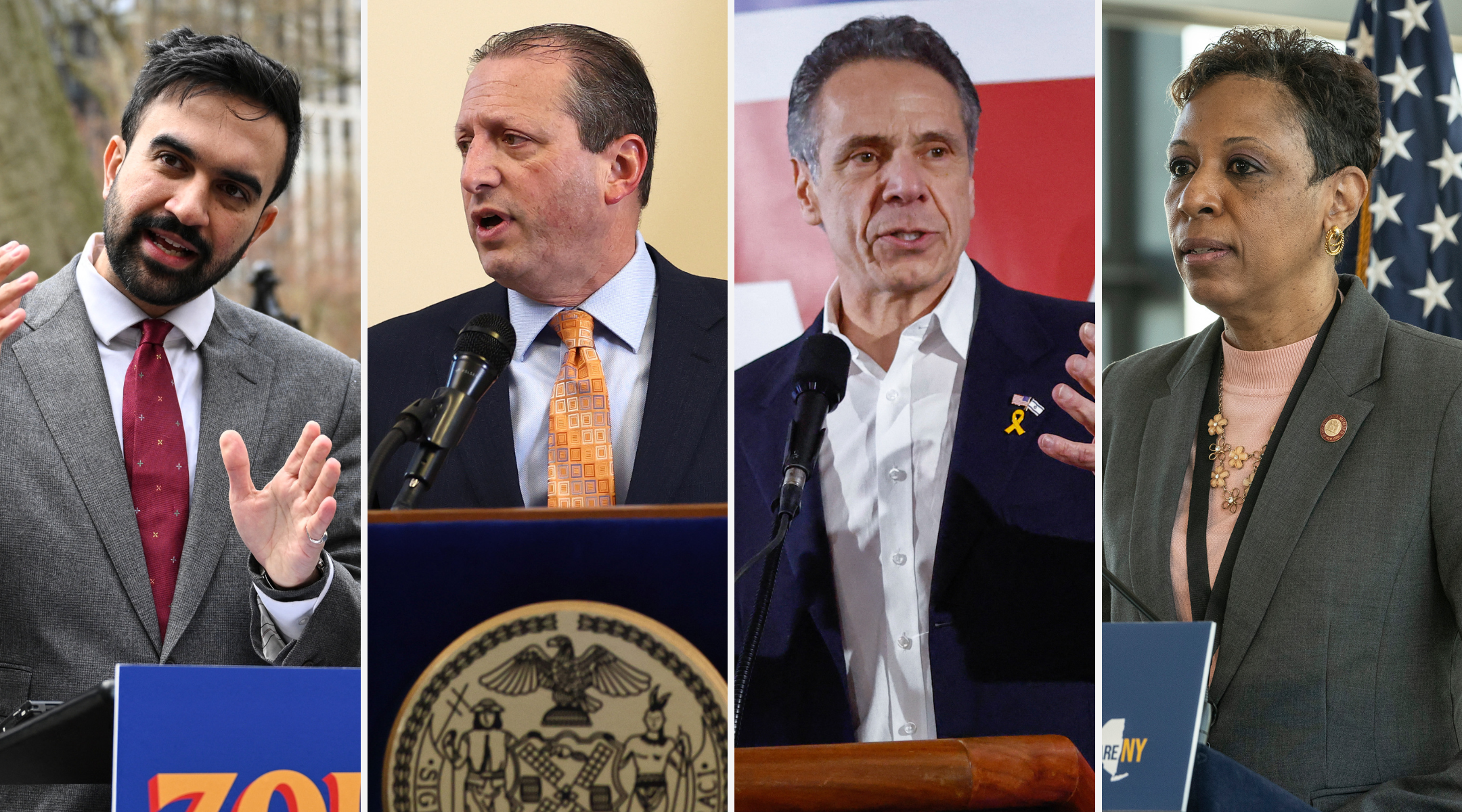The campaign for New York City’s next mayor is in full swing. And for New York’s 1 million-strong Jews, the 2025 mayoral election comes at a time of high anxiety.
Hate crimes against Jews in the city have risen since Oct. 7, 2023, accounting for over half the city’s total hate crimes last year, and the ongoing Israel-Hamas War and pro-Palestinian protests in the city have divided Jewish communities. Meanwhile, Donald Trump’s election — and his intervention in the city since taking office — has New York City’s many liberal voters hoping for a mayor who will stand up to the Republican president.
A crowded pool of candidates are vying for the Democratic nomination in the June 24 primary, which will in all likelihood determine who becomes mayor in 2026.
But one prominent candidate — Mayor Eric Adams, the incumbent who’s faced corruption charges and record-low approval ratings — is skipping the Democratic primary, running instead for re-election as an independent.
Adams’ field of Democratic challengers spans a wide spectrum of viewpoints, and while some candidates are household names, others may be far less familiar. A few are themselves Jewish. Keep scrolling to see what each of the candidates have said publicly about antisemitism, Israel and Jewish-related topics.
Adrienne Adams
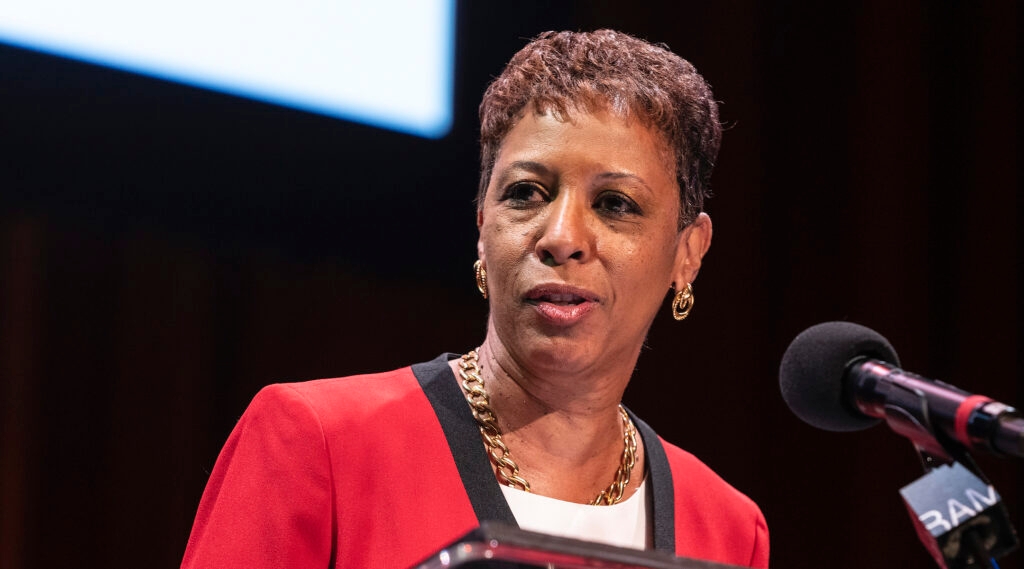
(Lev Radin/Pacific Press/LightRocket via Getty Images)
NYC Council Speaker Adrienne Adams officially kicked off her mayoral campaign on March 8. A scandal-free (so far), moderate alternative to embattled incumbent Eric Adams and presumptive favorite Andrew Cuomo, she faces an uphill battle given her lack of name recognition outside political circles — and, ironically, the potential confusion that comes from sharing a surname with the current mayor, to whom she is not related — plus a late start on raising funds.
But Adams has gained some momentum over the course of the spring, as she won endorsements from Letitia James, the state attorney general, as well as three major union leaders.
If elected, Adams, 64 — who represents the Queens’ 28th district, which includes parts of Richmond Hill, Jamaica, South Ozone Park and Rochdale Village — would be the first woman to serve as NYC mayor, as well as the first Council speaker to do so.
While in office, Adams has observed important Jewish commemorative dates such as the anniversary of Kristallnacht, and, last year, she attended a Passover Seder with approximately 70 Holocaust survivors. This year, she joined the Met Council, a Jewish non-profit dedicated to fighting poverty, in distributing food to food-insecure New Yorkers for the Passover holiday.
Shortly before she launched her mayoral campaign, the executive director of the Jewish Community Council of Greater Coney Island, which works with thousands of Holocaust survivors across Brooklyn, said Adams is a “blessed leader” who “ensures that even the most underprivileged New Yorkers are not forgotten. Adams had worked with the group to establish the city’s first three trauma recovery centers, which are “designed to reach survivors of violent crime who have less access to traditional victim services,” according to the Council website.
In 2022 she skipped a City Council educational trip to Israel, led by the city’s Jewish Community Relations Council, though she said she supported her colleagues who attended and was “proud” that they did so. She did not indicate that she had any qualms about taking part in the trip, but decided that it was “prudent” to remain in New York to focus on budget and pandemic issues, a spokesperson told the Forward at the time.
Eric Adams
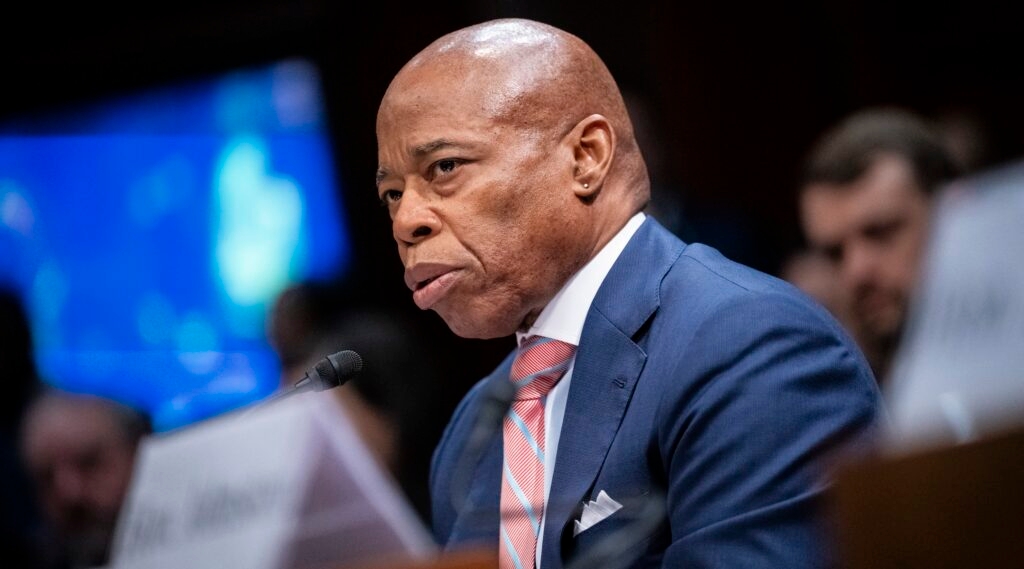
(Graeme Sloan / The Washington Post via Getty Images)
Recent polls suggest that New Yorkers aren’t excited by a prospective second term for Mayor Eric Adams, who’s been the subject of a federal corruption probe and became the city’s first sitting mayor to be indicted last September. According to a Quinnipiac University poll from March, his approval rating is at 20% — the lowest for any mayor since Quinnipac began polling registered NYC voters in 1996. More than half of respondents said Adams should resign.
Adams, 64, has been criticized by his Democratic challengers for cozying up to Trump since Trump was voted back into the White House. He has also been accused of striking a quid pro quo with the Justice Department, which would drop all corruption charges in exchange for Adams’ assistance in carrying out Trump’s immigration policies. Adams’ camp has denied any wrongdoing.
In early April, Adams announced that he would skip the Democratic primary in June, deciding instead to run as an independent candidate in November’s general election. Adams is petitioning to run on two ballot lines, which will appear in place of a party name on the ballot: “EndAntiSemitism” and “Safe&Affordable.” Adams’ decision “highlights one of his few remaining areas of unbridled political support,” according to Politico — namely, Orthodox Jews.
Adams is staunchly pro-Israel, and as Brooklyn’s borough president from 2014 to 2021, he has successfully courted support from the city’s Orthodox communities, which helped prop up his nomination for mayor back in 2021. He’s one of a growing number of politicians who’ve visited the gravesite of Menachem Mendel Schneerson, known as the Chabad Rebbe; Adams has made at least six visits to the site. In April, Adams also attended and spoke at the co-naming of President Street, where Schneerson had lived, to Lubavitcher Rebbe Way.
That close relationship hasn’t always sat well with the city’s more liberal Jewish communities. In 2022, Adams met with 55 women rabbis and cantors, who sought the meeting out of concern that the Orthodox Jews Adams regularly consulted don’t represent the political or religious diversity of the city’s Jewish community. A year later, when Adams inaugurated his Jewish Advisory Council — which was assembled to address issues affecting Jewish New Yorkers — he faced criticism for its lack of diversity: Of its 37 members, 23 were Orthodox, and only nine were women.
During his time as mayor, Adams has called himself “a modern-day Maccabee,” at a pre-Hanukkah party at Gracie Mansion last year, and compared calls for his resignation to “Mein Kampf.” Blowback ensued.
Adams has consistently denounced antisemitism and been a vocal supporter of Israel. He has condemned antisemitism at numerous pro-Palestinian protests, as at Columbia University, and defended the NYPD after violent arrests were made at a demonstration in Bay Ridge.
As a former police captain, Adams has been strongly pro-police throughout his term — for example, in an effort by Adams to reduce crime in the city’s transit system, the NYPD’s overtime pay for officers in the subway skyrocketed from $4 million in 2022 to $155 million in 2023. In November he appointed Jessica Tisch, who hails from a prominent Jewish family, as NYPD commissioner, making her the first woman to hold that position in the department’s 179-year history.
Selma Bartholomew
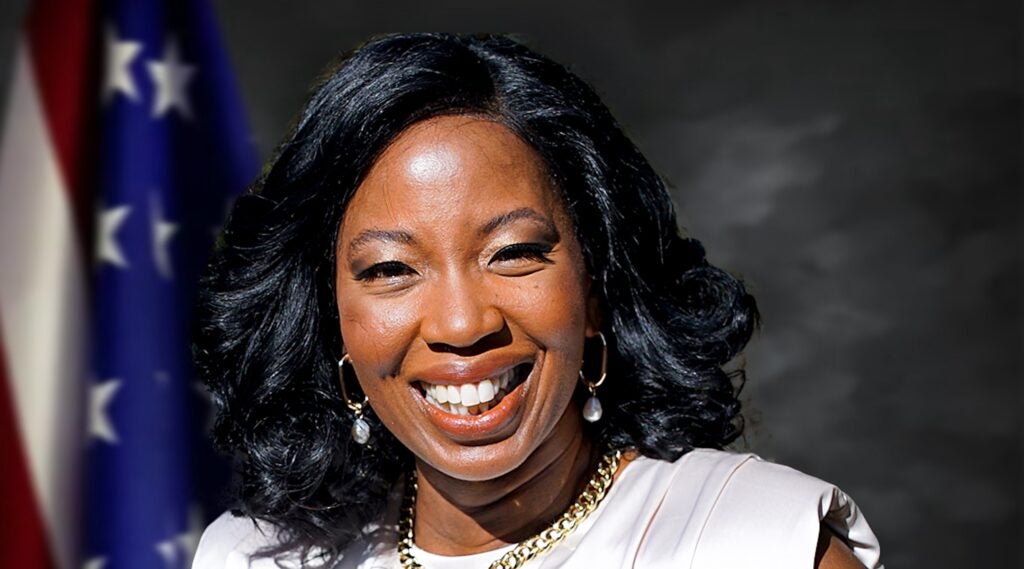
(Courtesy)
A public school teacher and education consultant, Bartholomew’s low-profile campaign — she and her campaign don’t have any public-facing social media accounts — emphasizes the importance of improving education, as well as providing affordable housing. Her policy plans include creating a formal quality of life assessment, providing free metro cards for 18-to-21-year-olds, and improving transportation services for seniors.
In Bartholomew’s few public appearances, she has not made any comments relating specifically to Jews or Israel. But in an email to the New York Jewish Week addressed to NYC’s Jewish community, Bartholomew wrote: “As a woman of faith, I write to you with a heart full of concern — for you, your children, and our shared future. I am deeply moved by the challenges our communities face and committed to building a New York City where we care for one another, protect our children, and restore a culture of care, connection and compassion.”
She added that she believes in “building bridges — between neighbors, between generations, and between youth and police,” and wrote: “I see you, I honor your history. Let’s come together, and show the world that we can take care of each other, can build a safer, more unified city and show the world what it means to work together. New York, lead the ways.”
Michael Blake
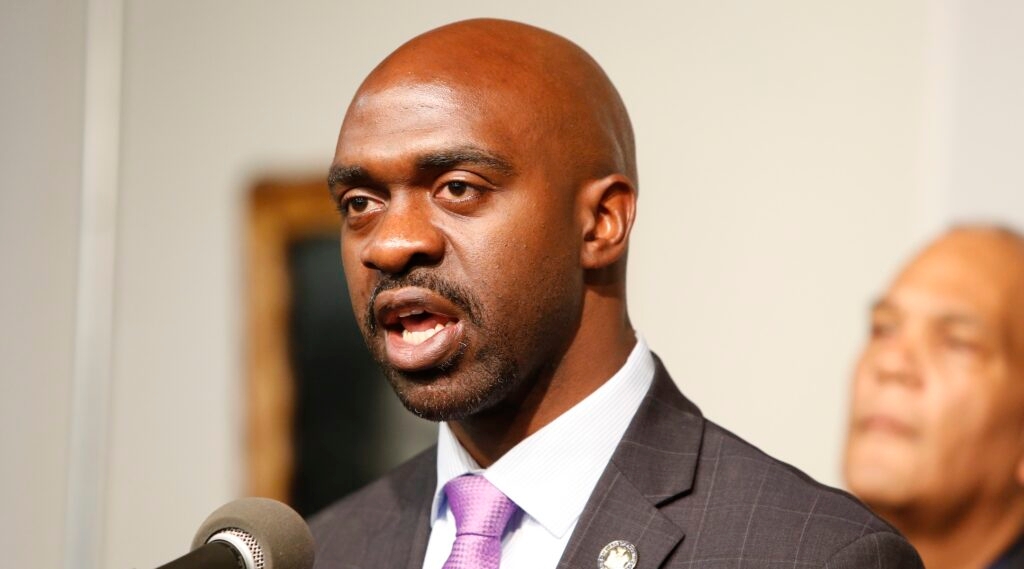
(Andy Katz/Pacific Press/LightRocket via Getty Images)
Before finishing second to Ritchie Torres in the Democratic primary for a seat in Congress in 2020, Michael Blake served as a state assemblymember representing part of the Bronx from 2015 until 2021. And now, Blake, 42, a former Obama staffer who also served as vice chair of the Democratic National Committee, is running for mayor on a platform that includes universal child care and a tax break for middle-class homeowners.
Blake’s views on Israel have seemingly transformed since Oct. 7, 2023. Speaking at an AIPAC policy conference in 2017, Blake said that his trip to Israel with the AIPAC-affiliated American Israel Education Foundation made him a “better legislator” and “a better activist.” He added, “It helped me to understand that as a leader within my community and the Democratic Party, I have a responsibility to support America’s friend and ally, Israel.” Blake has also spoken about the impact that traveling to Israel had on him as a Christian.
More recently, however, Blake has been vocally critical of Israel, tweeting on Oct. 23, 2023, “Genocide. It’s happening right before our eyes,” and aligning himself with elected officials like then-Rep. Jamaal Bowman, who Blake said was being attacked by pro-Israel advocates “for having principles.”
He voiced support for the campus pro-Palestinian protests in the spring of 2024, posting on X that the discussion should not be centered around the number of protesters arrested but rather “WHY people are protesting.” He added, “It’s not Antisemitic to speak your mind. It’s not Islamophobic to speak your mind. It’s America.”
In a statement on the one-year anniversary of the Oct. 7 attack, Blake wrote that we “must continue finding every possible way for the return of the hostages,” and that “[t]he path to peace begins by acknowledging Hamas’ act of terror.”
Blake attended a second-night Passover seder at Congregation Beth Elohim this past April — which coincided with Palm Sunday, and was held jointly with members of Antioch Baptist Church — calling it an “incredible, inspiring” night.
Andrew Cuomo
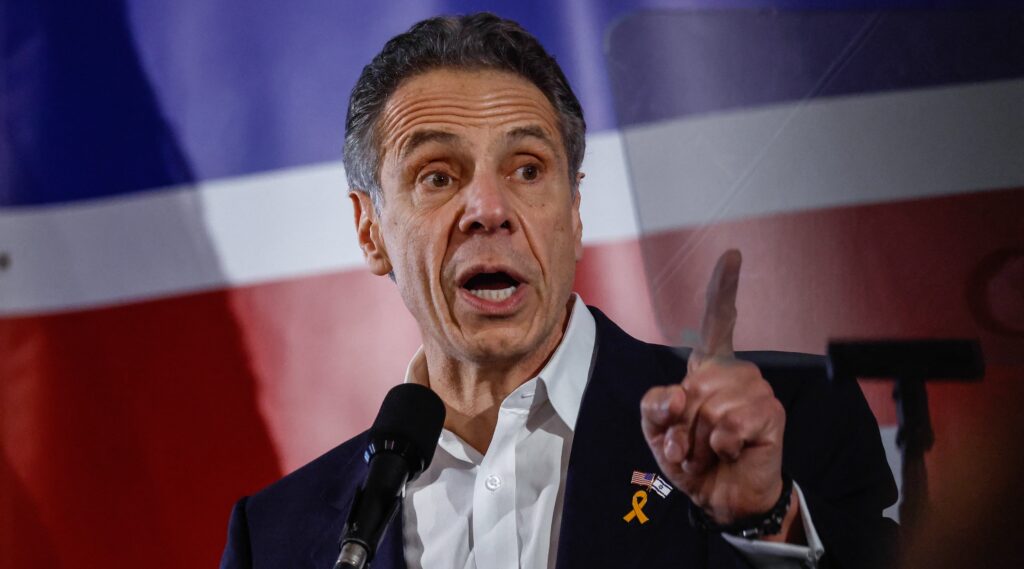
(Kena Betancur / AFP via Getty Images)
Andrew Cuomo’s 10-year stint as New York governor came to an end in 2021, when he resigned after multiple women accused him of sexual harassment. The Justice Department announced, following a settlement, that Cuomo had sexually harassed 13 women who worked for the state over an eight-year period. Now, one election cycle later, Cuomo is seeking a political comeback.
Cuomo, the son of former three-time New York Gov. Mario Cuomo, has a commanding lead in the polls — likely a combination of sky-high name recognition and a relative dearth of centrists in the race.
Cuomo, 67, who has lots of history with New York City’s 1 million Jews, may try to tap into the Jewish constituencies that supported him during his decade in Albany — from pro-Israel activists to the city’s haredi Orthodox communities, which helped prop up Eric Adams’ 2021 victory. Cuomo had a Bukharian community fundraiser in late April, which the Bukharian Jewish community page posted on Instagram; in the 2021 primary, Bukharian Jewish leaders had backed Eric Adams.
In his 17-minute campaign launch video, Cuomo declared that New York should “be at the forefront” in “leading the fight against the global rise of antisemitism” — a sentiment that he echoed in May while addressing congregants at Shaare Zion, the largest synagogue serving Brooklyn’s Syrian-Sephardic community.
In April, during a speech at West Side Institutional Synagogue, Cuomo called antisemitism “the most serious and most important issue” in the mayoral campaign and “in many ways, the toughest issue facing the city of New York and the country.”
In that same speech, Cuomo said, “It’s very simple: anti-Zionism is antisemitism,” and hinted that some of his opponents — including Brad Lander, who clapped back by cursing Cuomo in Yiddish — were part of the problem of antisemitism.
Following the ICE arrest of Columbia grad and Palestinian protest leader Mahmoud Khalil, Cuomo “unequivocally condemned” the “fear and terror stoked by many organizers on campus property against their Jewish classmates.” He added, “There are real questions about the wider implications of this detainment, and the federal government and the courts need to be clear with the public about the justification for their position and actions. The rule of law matters and we must never forget that regardless of the political view expressed, however abhorrent.”
As governor, Cuomo took public steps to stem antisemitism, like ordering the formation of a hate crimes unit in the state police, providing additional security funding for Jewish institutions, putting more police in Jewish neighborhoods and spearheading a law defining antisemitism as domestic terrorism.
But while Cuomo cultivated haredi Orthodox votes during his three runs for governor, his relationship with these voters soured in 2020 when he sought to enforce COVID-era public health restrictions in neighborhoods like Borough Park and Midwood — singling out haredi Orthodox communities, critics said. That October, the haredi umbrella body Agudath Israel of America sued him for discrimination.
The next year, the New York Times reported that Cuomo had expressed disdain for Jewish practices: While at an event celebrating the fall festival of Sukkot, he allegedly remarked, “These people and their f—ing tree houses.” His spokesperson denied the allegation and said, “He has the highest respect for Jewish traditions.”
As governor, Cuomo was a vocal supporter of Israel, signing an executive order banning the state from investing in companies that promote boycotts of Israel. In 2014, he visited Israel during a previous war with Hamas in Gaza. In 2018, he was the grand marshal of the city’s Celebrate Israel Parade.
After he resigned, pro-Israel activism was part of his incipient comeback bid. Last year, he announced the launch of a group called “Progressives For Israel.” He later renamed it “Never Again, Now!” and in July mounted an ad campaign criticizing pro-Palestinian demonstrations. Recently, however, the New York Times reported that the group’s actions “have amounted to little beyond a few private informational receptions and opinion essays.” Fellow mayoral candidate Scott Stringer, who is Jewish, ripped “Never Again, Now!” as a mere vehicle to prop Cuomo’s political comeback campaign, and said the ex-governor “never lifted a finger.”
Brad Lander
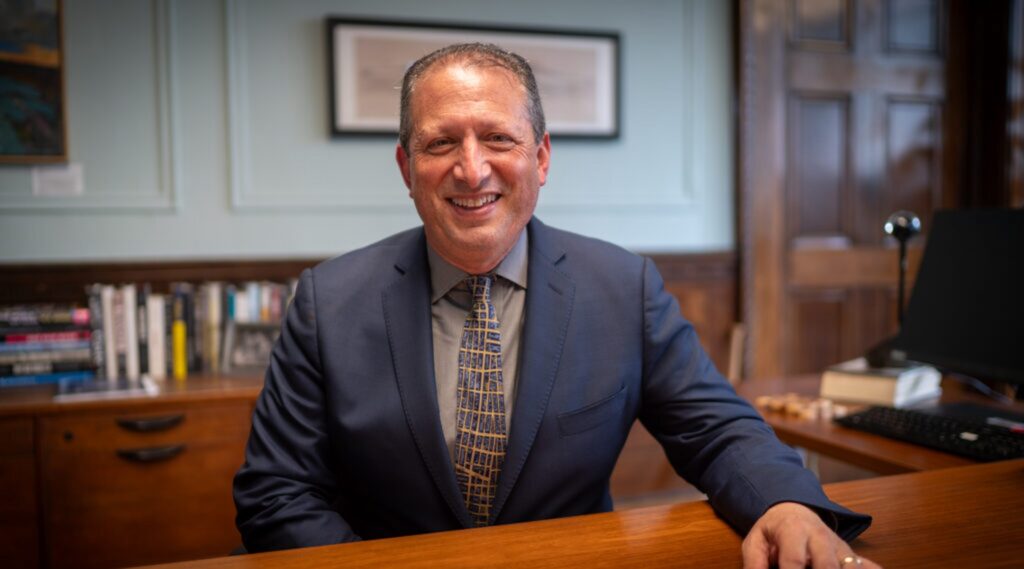
(Luke Tress)
Brad Lander, the city’s comptroller responsible for fiscal oversight, announced his mayoral run last July. He is the city’s highest-ranking Jewish official — and among the most progressive.
Citing the fight against antisemitism as a priority, Lander laid out his plans for combating crime with a 17-page proposal in March. “I take that very seriously as the highest-ranking Jewish elected official in city government, and will do everything I can to combat it as mayor,” he told the Times of Israel.
A veteran of progressive nonprofits and a former City Council member representing the liberal Brooklyn bastion of Park Slope as well as a slice of Borough Park, Lander is a member of Kolot Chayeinu, a congregation that makes a point of welcoming a diversity of views on Israel. He has also been a regular attendee at Israeli-led rallies calling for a ceasefire in the Israel-Hamas war.
“That has been a place where I feel both proud to go and have my neshama nourished,” Lander told the New York Jewish Week last year, using the Hebrew word for soul. “People are going to criticize whatever you do. All I can say for sure is, I come by my point of view here honestly. This is who I am Jewishly and politically.”
Lander, 55, grew up in a Reform Jewish community outside of St. Louis and worked at a Reform movement summer camp. He counts campaigning to liberate Soviet Jews and Rabbi Abraham Joshua Heschel, the mid-century Jewish scholar and civil rights activist, as two political inspirations.
Lander first called for a humanitarian ceasefire in the Israel-Hamas war in November 2023, shortly before there was a weeklong truce. He kept up the ceasefire calls after that, when such positions were still uncommon among even progressive Jewish officials.
“I was before and am now a liberal Zionist who fiercely opposes the occupation,” he told the New York Jewish Week in August.
Following the ICE arrest of Columbia grad and Palestinian protest leader Mahmoud Khalil in March, Lander wrote on social media, “I disagree strongly with things that were said in the protests he reportedly led. But it will not make Jews — or any of us — safer for the federal government to deport people for saying things we may find hateful.”
Lander has drawn criticism from some in the Jewish community for maintaining alliances with politicians and activists who oppose Israel. For example, pro-Israel advocates in Lander’s former Park Slope district have voiced concern over whether he’s close with his successor, Council Member Shahana Hanif, who’s come under fire for a track record on Israel that includes retweeting the phrase “Globalize the Intifada.” Lander told the New York Times that he was “deeply disappointed” by people like Hanif who did not immediately condemn the Oct. 7 attack, and said he’d encouraged her and other elected officials to meet with families of Israeli hostages.
Lander and Zohran Mamdani both drew the endorsement of The Jewish Vote, the electoral arm of the progressive organization Jews for Racial and Economic Justice. Lander, along with Mamdani and Hanif, spoke at JFREJ’s “Seder in the Streets” at Columbus Circle, which billed itself as “a condemnation” of Eric Adams, Andrew Cuomo and Donald Trump.
He also called out, and uttered a Yiddish curse — “A beyzer gzar zol er af dir kumen,” which translates literally to “May an evil decree come upon him” — at Andrew Cuomo, after the ex-governor hinted that Lander was part of the problem of antisemitism. Cuomo also claimed that Lander divested city funds from Israel — a claim which Lander has denied. “Andrew Cuomo doesn’t get to tell me how to be Jewish,” Lander said.
Zohran Mamdani
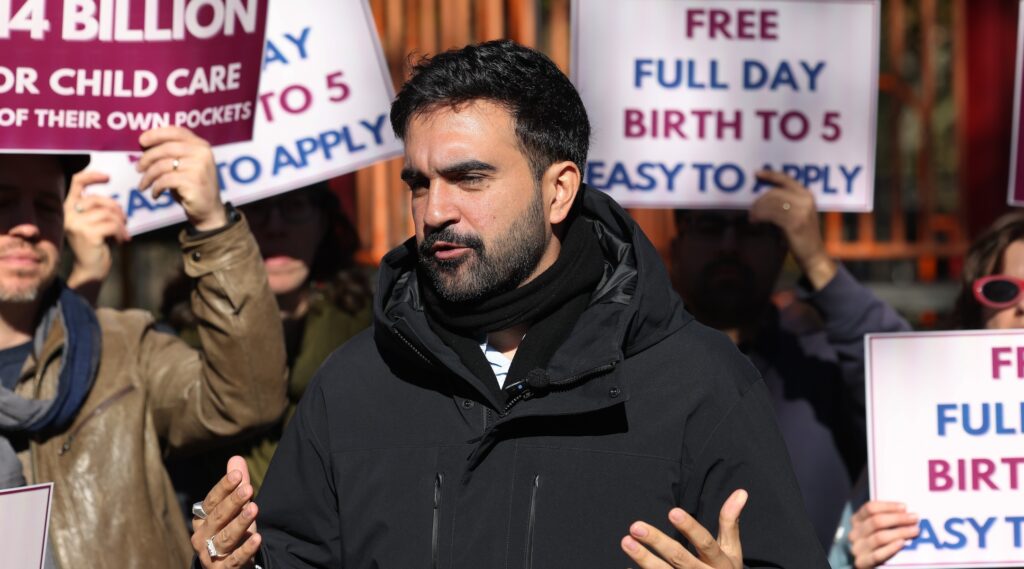
(Michael M. Santiago/Getty Images)
A state assemblymember representing Astoria, Queens, Zohran Mamdani is described by City & State as a “pro-Palestine Socialist Democrat who isn’t shy about it.” Perhaps the candidate who’s farthest to the left, Mamdani — who, if elected, would be NYC’s first Muslim mayor — is running on the promise that he will “freeze the rent, make buses fast + free, and deliver free universal healthcare,” as his bio on X states.
Mamdani’s campaign has been picking up steam, with donations coming in from over 19,000 individuals as of May 6; the next-highest number is Brad Lander with 6,319. He’s currently polling second behind Andrew Cuomo. Mamdani is, in the words of Vogue magazine, seen as the “cool” mayoral candidate. In early May, he held a rally at the music venue Brooklyn Steel which “had more of a party-like atmosphere than a traditional campaign event,” the New York Post wrote; there, fashion designer Ella Emhoff — the Jewish former second gentleman Doug Emhoff’s daughter — gave her endorsement.
Mamdani has been met with resistance from pro-Israel voters. While many New York officials condemned Hamas’ Oct. 7, 2023, attack on Israel, Mamdani’s statement the next day focused largely on Israel: “I mourn the hundreds of people killed across Israel and Palestine in the last 36 hours,” he wrote. “Netanyahu’s declaration of war, the Israeli government’s decision to cut electricity to Gaza, and Knesset members calling for another Nakba will undoubtedly lead to more violence and suffering in the days and weeks to come.”
He added, “The path toward a just and lasting peace can only begin by ending the apartheid and dismantling the occupation.”
Nonetheless, Mamdani condemned the Democratic Socialists of America-promoted pro-Palestinian rally in Times Square the next day. “My support for Palestinian liberation should never be confused for a celebration of the loss of civilian life,” Mamdani said in a statement. “I condemn the killing of civilians and rhetoric at a rally seeking to make light of such deaths.”
Mamdani, 33, has voiced support for the Boycott, Divestment and Sanctions movement, calling it “righteous,” and introduced a bill called the “Not on our dime!: Ending New York Funding of Israeli Settler Violence Act,” which would block charities in the state from supporting Israeli settlements in the West Bank. (The bill failed to advance after opposition from legislative leaders.)
Mamdani has found support from progressive Jewish organizations like Jews for Racial & Economic Justice, whose electoral arm officially endorsed him and Lander, while other Jewish leaders have encouraged NYC voters to register as Democrats in order to stifle his primary bid. In an attempt to broaden his support, Mamdani attended an event hosted by the Council of Jewish Organizations in Flatbush, a heavily Orthodox neighborhood with a politically conservative electorate. He posed for photos with Orthodox Jewish leaders and activists — and got some blowback on social media.
Zellnor Myrie
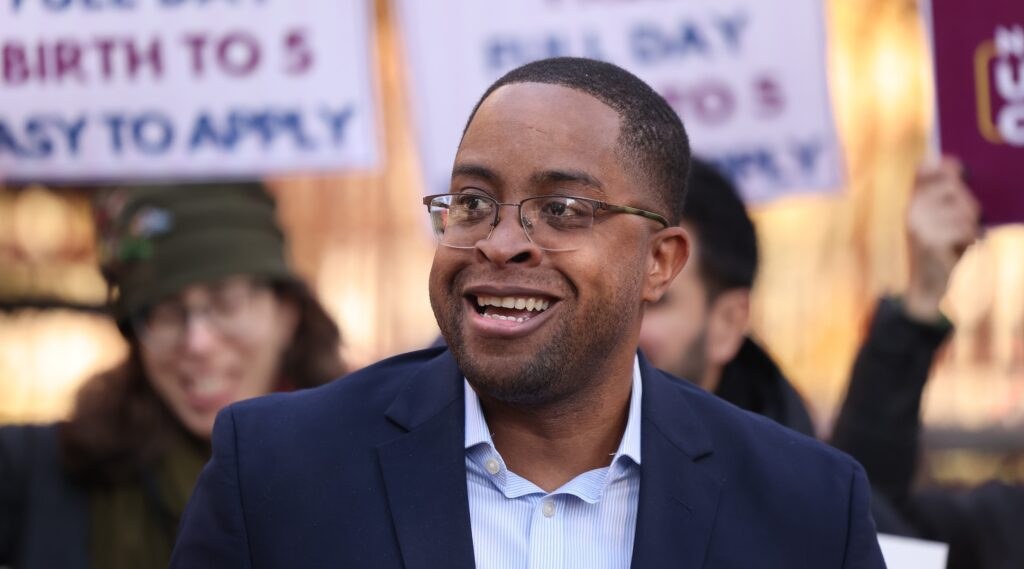
(Michael M. Santiago/Getty Images)
A state senator for the 20th district in central Brooklyn, Zellnor Myrie has lagged far behind in the polls; in a late-April poll by Race to the White House, just 1% of likely Democratic voters picked Myrie as their favorite candidate. In February, however, he garnered a high-profile endorsement from Jewish Rep. Dan Goldman, who praised Myrie in a joint appearance on MSNBC’s “Morning Joe” and called the candidate a “true visionary” who would stand up to Trump.
Myrie, who is the son of Costa Rican immigrants and would be NYC’s third Black mayor if elected, occupies a more progressive lane among the candidates — but in a 2024 Politico interview, he shied away from labels. “When I talk to everyday New Yorkers, their concern isn’t whether I’m a progressive, a moderate or conservative,” he said. “Their concern is can I make the city more affordable? And can we run government in a competent way?”
Myrie, 38 — whose district includes Crown Heights, home to a significant Orthodox population — has courted Jewish leaders and Orthodox voters who generally lean to his right. In 2019, two weeks after the Chabad of Poway shooting in California, Myrie introduced a bill honoring the birthday of Chabad’s Schneerson, to “truly recognize the work that the Rebbe did.” He also sponsored a bill that would honor Schneerson upon the co-naming of President Street to Lubavitcher Rebbe Way in April, and extolled Schneerson at the state Senate before attending the ceremony itself. Myrie has advocated for increasing funding for hate crime prevention and suggested expanding the state curriculum to include education on Jewish history.
“I think the Orthodox community, much like the rest of the city, cares deeply about safety, but they have a particular sensitivity to this because they are visibly Jewish,” Myrie, who was born and raised in Crown Heights, told the Forward. “This has been part of who I am as a New Yorker, growing up in and around the Jewish community.”
Myrie issued a statement on Oct. 7 condemning Hamas’ attack on Israel, in which he said, “Israel has the right to defend itself, and I pray it does so in a way that increases the chances of an eventual lasting peace.” Myrie has said that he’ll “always defend the right to peaceful protest” and he has condemned pro-Palestinian demonstrations that harassed Jewish people, like at the Brooklyn Museum last year and in the Orthodox community of Borough Park this February. Like Stringer, he is seen as potentially appealing to Jewish voters who might view Lander as too critical of Israel.
Paperboy Love Prince
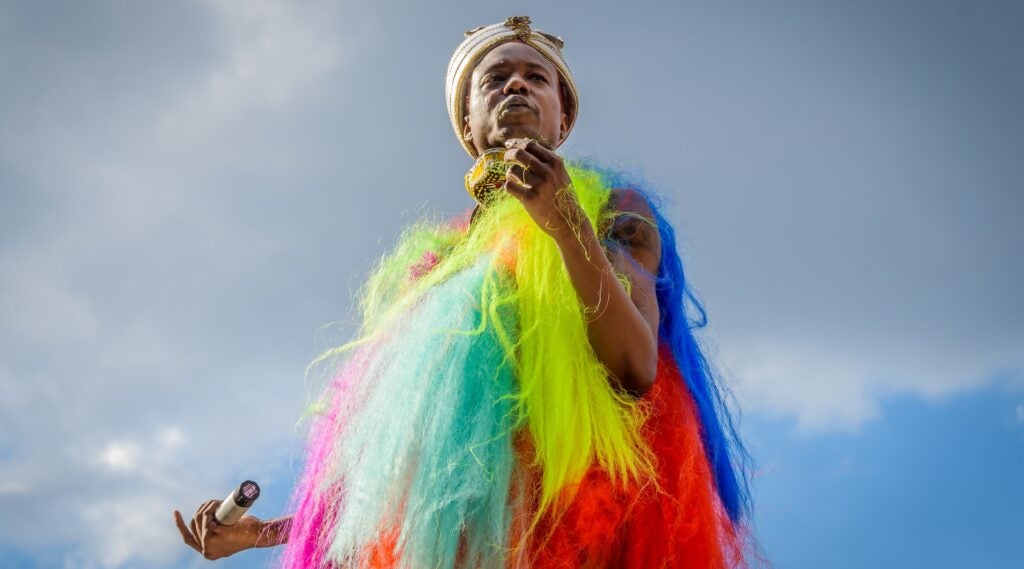
(Erik McGregor/LightRocket via Getty Images)
A content creator, community activist and music artist who ran for mayor in 2021, Prince, who uses they/them pronouns, has called for “free health care, abolishing the police and granting a universal basic income for all New Yorkers,” according to the New York Times, and released a song on May 2 titled “Utopia Plan” that outlines their vision for the city.
Prince has made headlines appearing in clown makeup at various events, including a recent Black Agenda mayoral forum to which they were not invited.
Prince has referred to Israel’s military campaign in Gaza as a “genocide” since as early as November 2023, and wrote on X in January 2024 that they’re “pro Palestine and ceasefire.” In December 2023, they wrote “Happy Hanukkah” on X, adding, “Love you hope this season is awesome.”
Jessica Ramos
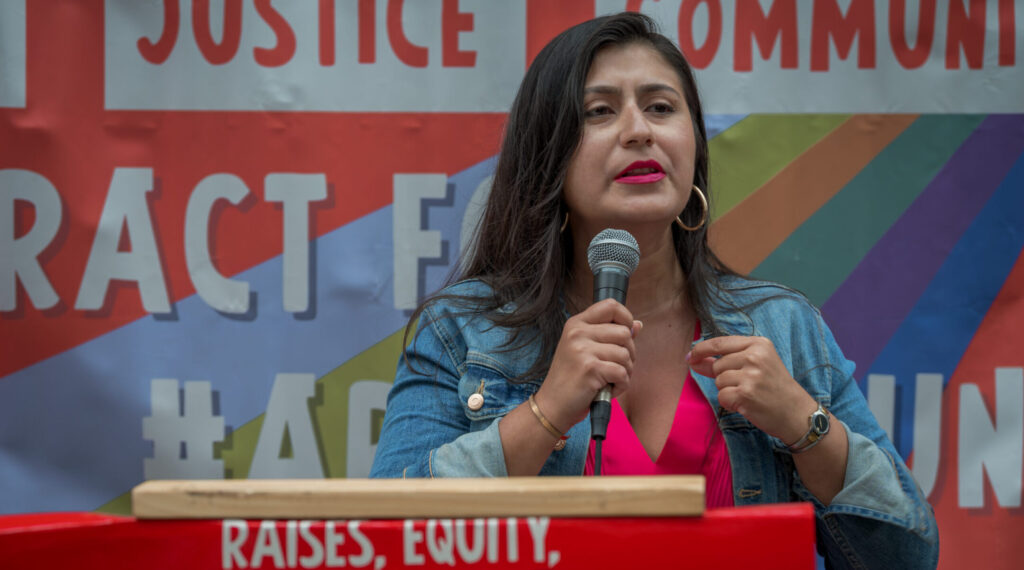
(Erik McGregor/LightRocket via Getty Images)
A state senator representing parts of Queens, Jessica Ramos is one of a few progressive candidates vying for the Democratic nomination. Ramos says her campaign will focus on making the city more affordable and hospitable to immigrants. If elected, she would be the first woman and first Latina to helm the city.
Ramos, 39, regularly posts holiday and Holocaust commemoration messages for Jewish New Yorkers on social media, and she has also met with Jewish constituents including students from Hebrew Academy of Nassau County, a large Orthodox school. Though her own district — which covers Corona, Elmhurst, East Elmhurst and Jackson Heights — does not have a large Jewish population, in 2023 she co-sponsored a bill requiring state correctional facilities to provide kosher and halal food options.
Ramos is also a longtime pro-Palestinian advocate. A decade ago, during a conflict between Israel and Hamas, she ignited an early firestorm in Democratic politics when she tweeted, using a notation meant to simulate a heart, “Palestine <3.” Last March, she became the 13th state senator to call for a permanent ceasefire in the current Israel-Hamas war, saying in a statement, “As a New York State Senator, I stand for de-escalation, diplomacy and human rights for all people — Palestinian and Israeli.” She also said at the time that she saw Israel’s actions in the West Bank as akin to repression in her parents’ native Colombia.
Scott Stringer
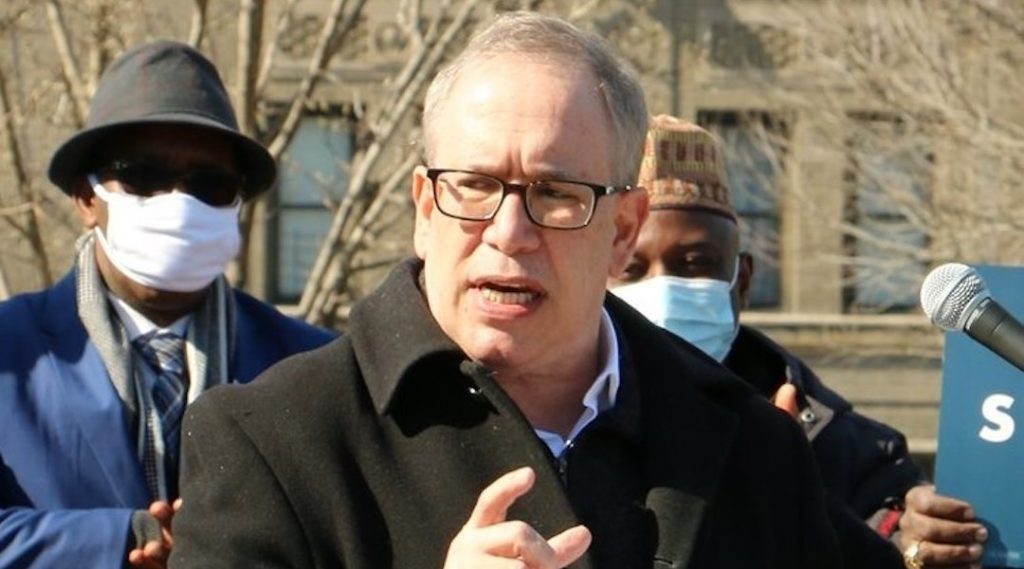
(Courtesy Stringer for Mayor)
Scott Stringer, a former Manhattan borough president who served as the city’s comptroller from 2014 until 2021, ran for mayor as the only Jewish candidate in 2021. An early adopter of progressive policies like closing Rikers Island and implementing a new property transfer tax, Stringer’s 2021 campaign was derailed by sexual harassment allegations that he denied. (A second woman also came forward accusing Stringer of sexual misconduct.) He sued the accuser for defamation, but the lawsuit was dismissed because he filed it after the statute of limitations for the case.
Stringer, 64, is a former aide to Rep. Jerry Nadler, the Jewish Democrat who has represented the Upper West Side (and now Upper East Side) for decades, and cited him as one of the people he turned to for advice on Jewish issues in his 2021 bid.
Stringer has also attended Congregation Rodeph Sholom, the Upper West Side Reform synagogue, along with his wife Elyse Buxbaum, the COO of the Museum of Jewish Heritage. Their two sons attend New York City public schools.
Stringer has not held public office since finishing his second term as comptroller and has made only limited public comments about the Israel-Hamas war. On Oct. 8, the day after Hamas attacked Israel, he posted on social about a pro-Palestinian demonstration that included celebration of Hamas, “This rally is total bullshit!” He is seen as likely to appeal to Jewish voters who see Lander as too far to the left on Israel.
Following the ICE arrest of Columbia grad and Palestinian protest leader Mahmoud Khalil in March, Stringer said in a statement, “While I disagree with many of the tactics and rhetoric of the protests at Columbia, the Trump administration detaining a green card holder for engaging in speech they don’t like is a clear violation of First Amendment rights.”
West Side Democrats, a group that represents the heavily Jewish and high-voter-turnout Upper West Side area, has endorsed Stringer, and celebrated the opening of a pop-up campaign office in early May.
Stringer toured Jewish businesses in Borough Park, a heavily Orthodox Brooklyn neighborhood, ahead of Passover.
Speaking at the West Side Institutional Synagogue in April, he blasted Andrew Cuomo for starting an advocacy group, “Never Again, Now!” that he accused of simply being a campaign tool.
“He actually showed up in people’s living rooms and promised to set up an organization that would run commercials, host symposiums and — with money raised from the Jewish donor community — join the fight against rising antisemitism,” Stringer said. “But he never lifted a finger. There were no commercials. Nothing,” Stringer added. “This organization was a vehicle for his mayor’s race – and everybody knows it.”
Whitney Tilson
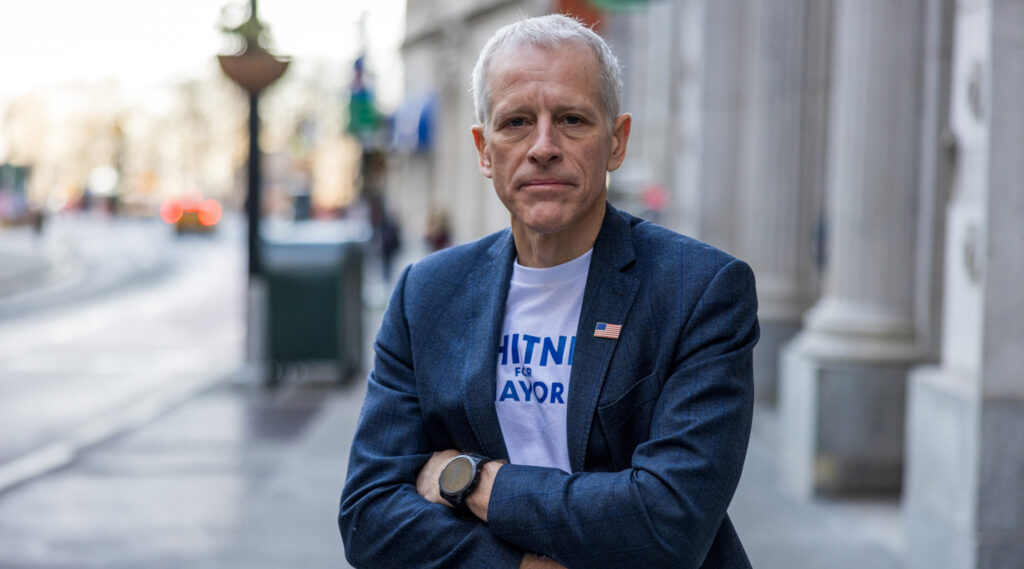
(Courtesy)
A former hedge fund manager and longtime advocate of charter schools, this is Whitney Tilson’s first foray into the world of electoral politics. Tilson’s campaign is focused on public safety and reining in government spending while growing the city’s economy.
While Tilson himself isn’t Jewish, his wife and three daughters are; he and his family have been members of Central Synagogue in Manhattan for 25 years. Tilson told amNY that he’d planned to join an anti-Trump rally in Washington Square Park on Inauguration Day, but that he was taken aback by the speeches and chants that he encountered. “It’s an anti-Israel rally, which is not what I was expecting,” he said.
“It’s very concerning to me that protests which at least initially appeared to be expressing sympathy to the Palestinian civilians who are suffering tremendously, and I’m very sympathetic toward that, have morphed into anti-Israel and antisemitic rallies, which is very troubling to me,” Tilson said. “I’m hearing a lot of chants that are genocidal. I know what ‘From the river to the sea’ means.”
A Harvard University graduate, Tilson, 58, voiced his anger toward his alma mater for not standing up to antisemitism in the month following the Oct. 7 attack, and said that he declined an invitation to meet with a fundraising officer.
“The damage that Harvard has done to its brand since Oct. 7 is only rivaled in history by New Coke and what Elon Musk has done to Twitter,” he wrote.
The New York Jewish Week brings you the stories behind the headlines, keeping you connected to Jewish life in New York. Help sustain the reporting you trust by donating today.
